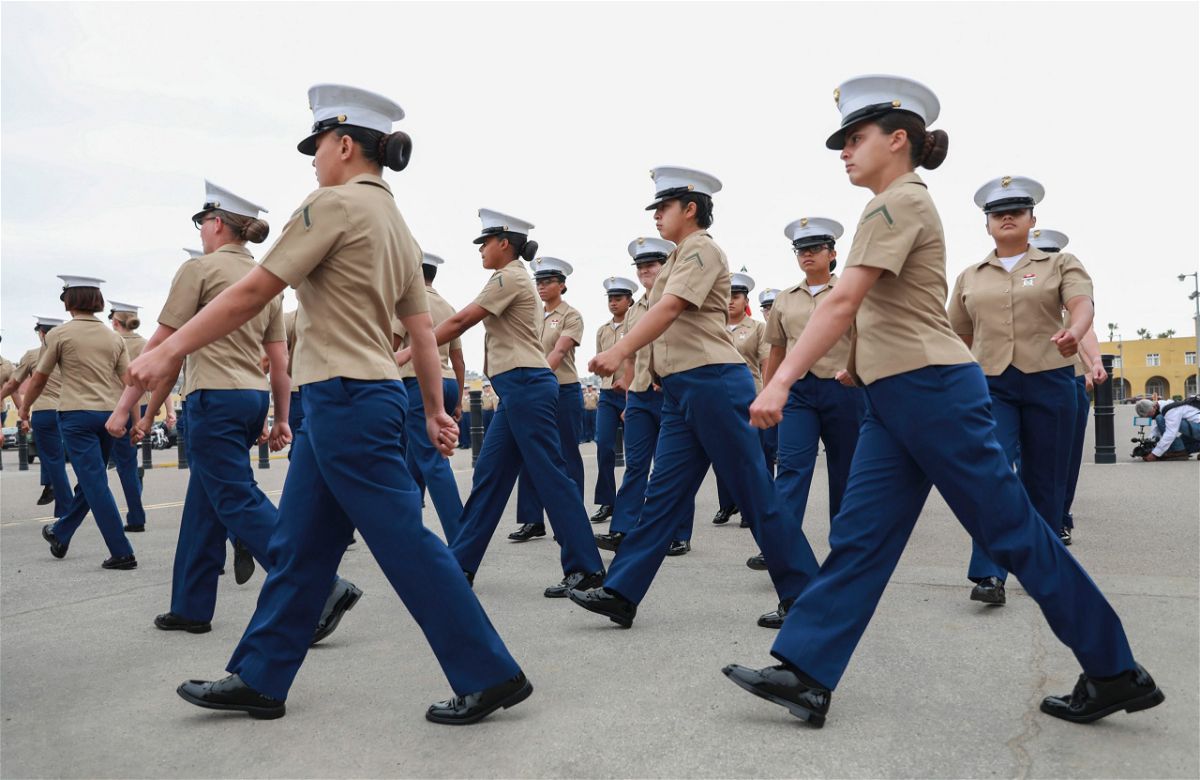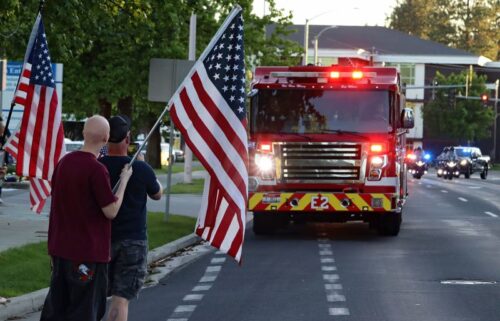A platoon of female Marines made history by graduating from this San Diego boot camp

It takes 13 weeks to complete boot camp at Marine Corps Recruit Depot, San Diego, where young recruits become hardened US Marines. The three-month course is considered one of the most difficult in any branch of the US military.
But before this year, male and female recruits never trained side-by-side.
This week, after grinding through three months of training and team building, the San Diego depot’s first gender-integrated class of Marines graduated after completing boot camp together. The historic first was motivated by the National Defense Authorization Act, signed in 2020, which required the Marines to begin training male and female recruits together before 2028.
Until recently, the two training depots were largely segregated by gender: Companies of women trained at the recruit depot in Parris Island, South Carolina, and men trained either in South Carolina or San Diego, but not concurrently with the women recruits. A coed company first trained together at Parris Island in 2019, CNN reported at the time.
“This graduation of the first integrated company of Marines trained here at MCRD San Diego marks the completion of the first step toward a future in which each Marine who graduates MCRD San Diego has the same experience as their peers at Parris Island,” said Brig. Gen. Ryan P. Heritage, commanding general of MCRD San Diego, in a statement.
The Marine Corps has always trained women and men separately since women were allowed to join the Corps (first during World War I, then in the 1940s when Congress allowed women to serve as permanent military members).
The military branch has also struggled to recruit women: According to the New York Times, just 8% of Marines are women — the lowest percentage among the US military branches. It was also the last military branch to adopt gender integration at its training facilities, the Times reported.
Pfc. Katey Hogan was a recruit with the groundbreaking Platoon 3241. She and the 52 other women recruits didn’t take their history-making training lightly, she said — it motivated her to perform at her best.
“We get to set the standard for other fellow future Marines or people who are inspired by us,” the 18-year-old Marine told CNN. “I definitely proved a point to people.”
Hogan’s platoon was one of six in the company that trained together at the San Diego facility, each made up of around 60 to 70 recruits each (Hogan’s platoon began with 60 women, but 53 of them completed the training). While the women’s platoon lived in a separate dorm, they attended classes with their male counterparts and competed against them in some events — and often scored the highest, a spokesman for MCRD San Diego said.
The women and men competed alongside each other in demanding endurance events known as “physical training,” which tested their strength and fitness. The women’s platoon bested the rest of the company in “final drill,” the spokesman said. It’s considered the most prestigious event — a drill that requires the platoon act in complete synchrony.
The platoon’s physical and mental synchrony wasn’t immediate, though. Hogan said the all-women Platoon 3241 resisted initial attempts to bond or build trust with each other.
“We struggled at first,” she said of Platoon 3241. “We didn’t want to communicate with each other.”
They grew close, inevitably, after spending nearly every waking moment together. That bond paid off in the most punishing challenge of all: “the Crucible,” a 54-hour course comprised of 24 events, including the feared “Reaper,” a 10-mile uphill hike made more difficult by heavy backpacks.
“We made it up that Reaper,” Hogan said. “We showed people that we can do exactly what everyone else can.”
It’s only after recruits complete the Crucible that they can be called Marines.
The new Marines are off to train again
The new Marines graduated this week in a ceremony attended by families they hadn’t seen in months. Hogan was named the honor graduate of her platoon for her exemplary leadership.
Photos from the graduation show Hogan and her platoon dressed in their uniforms, marching together with solemn, focused expressions. But once their drill instructor dismissed them, the Marines cracked smiles and dropped their perfect posture to celebrate together.
Hogan was beaming with pride at graduation, particularly when sergeant majors congratulated her as a fellow Marine.
“I felt like I actually accomplished my mission,” she said.
Perhaps the highlight of the day, though, was a hug from her dad, also a Marine. It was the first time she’d seen him cry.
“I feel like I’m (his) equal,” she said.
Hogan left Friday for Camp Pendleton, where she and the new Marines will continue their training. She’ll complete additional training after that and, eventually, settle on a Marine occupational specialty. She said she plans to remain in the Marines for 20 years.
As for where she’s stationed, she said she’s hoping to end back up in San Diego, home to the facility where she became a Marine. But she’s not tied to it.
“Anywhere (the Marine Corps) takes me, I’ll go,” she said.



